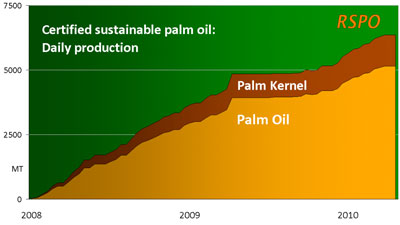The first shipment of palm oil certified under sustainability criteria have arrived in the United States, according to the Roundtable on Sustainable Palm Oil (RSPO).
AAK, a vegetable oils and fats manufacturer based in Malmo, Sweden, announced the arrival of the first shipment of segregated RSPO-certified palm oil to its refinery in Port Newark, New Jersey. Segregated RSPO-certified palm oil has been kept separate from conventional palm oil throughout the supply chain. Most “sustainable” palm oil users don’t actually use segregated certified sustainable palm oil (CSPO), Instead they offset conventional palm oil by purchasing the equivalent amount of GreenPalm certificates, which represent real CSPO sold elsewhere as conventional palm oil.
 |
The RSPO also announced that daily production of CSPO has now surpassed 5,000 metric tons per day. Since late 2008 more than 2.2 million tons of certified palm oil and 600,000 tons of certified palm kernals have been produced. About 600,000 tons of CSPO and kernals has been sold—mostly in Europe—so far in 2010.
Global palm oil consumption stands at nearly 50 million tons per year, about half of which is traded internationally. It is used widely in processed foods, cosmetics, and soaps — WWF estimates that palm oil is found in roughly half of packaged supermarket products. It is also increasingly used as a biofuel.
But while palm oil is a highly efficient crop, surging production over the past 20 years has spurred strong backlash from environmentalists who not that expansion has consumed vast areas of rainforest in Malaysia and Indonesia, triggering massive greenhouse gas emissions and putting endangered wildlife—including orangutans, pygmy elephants, Sumatran rhinos and tigers—at risk. Oil palm plantation development has also exacerbated social conflict in some areas.
The RSPO emerged as a response to these concerns. The body—which includes industry stakeholders as well as environmentalists and other groups—sets sustainability criteria for palm oil production. Nevertheless the initiative has been battered over the past year with revelations that some members have continued to destroy ecologically sensitive habitats. Prominent members, including Unilever and Nestle, have had to act outside the RSPO process to address misconduct by RSPO-member suppliers. Some critics say the scheme lacks oversight, sets a low bar for compliance, and is underfunded. Supporters argue that RSPO is still a relatively new initiative that needs more time to prove itself.
Related articles
Certified sustainable palm oil sales reach record level
(04/09/2010) Sales of palm oil certified under the green criteria set by the Roundtable on Sustainable Palm Oil (RSPO) reached a record high in March, climbing nearly 8 percent over February 2010 to 136,000 metric tons, reports the RSPO in its monthly bulletin.
Nestle’s palm oil debacle highlights current limitations of certification scheme
(03/26/2010) Last week Nestle, the world’s largest food processor, was caught in a firestorm when it attempted to censor a Greenpeace campaign that targeted its use of palm oil sourced from a supplier accused of environmentally-damaging practices. The incident brought the increasingly raucous debate over palm oil into the spotlight and renewed questions over an industry-backed certification scheme that aims to improve the crop’s environmental performance.
Consumers should help pay the bill for ‘greener’ palm oil

(01/12/2010) Palm oil is one of the world’s most traded and versatile agricultural commodities. It can be used as edible vegetable oil, industrial lubricant, raw material in cosmetic and skincare products and feedstock for biofuel production. Growing global demand for palm oil and the ensuing cropland expansion has been blamed for a wide range of environmental ills, including tropical deforestation, peatland degradation, biodiversity loss and CO2 emissions. In response to these concerns, a group of stakeholders—including activists, investors, producers and retailers—formed the Roundtable on Sustainable Palm Oil (RSPO) to develop a certification scheme for palm oil produced through environmentally- and socially-responsible ways. It is widely anticipated that the creation of a premium market for RSPO-certified sustainable palm oil (CSPO) would incentivize palm oil producers to improve their management practices.
Forest destruction by Sinar Mas undermines efforts to develop and promote greener palm oil
(12/14/2009) An investigation commissioned by Unilever, the world’s largest buyer of palm oil, confirms that Indonesian group Sinar Mas, the world’s second largest producer of palm oil, has been destroying forests and peatlands despite committing to “greener” palm oil production as a member of the Roundtable on Sustainable Palm Oil (RSPO). Unilever has now suspended its $32.6 million contract with Sinar Mas.














